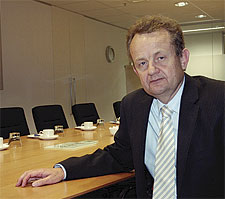This is an edited version of Jeremy Halcrow’s exclusive Southern Cross interview Steve McKerihan, CEO of the Glebe Administration Board, about the Diocese’s investment losses. The full interview can be read in the print edition, out this week, which will also appear as a PDF on this website shortly.

The background
JH: Steve, what is the Diocesan Endowment?
SMcK: Originally the Diocesan Endowment was in the form of real estate in the area of Glebe. Back in the 1970s the Federal Government bought those properties and that gave the Diocese the funds to invest. The funds were invested in commercial property, but in more recent years there was a change in the mix to include investment assets, shares, fixed interest, cash and a lower level of property investment"
Was that change made because there are problems with investing in property?
Yes, in the early 90s there was a severe recession that particularly affected that asset class and after that, it was thought it would be better to go to a more balanced set of investments.
Can you explain the "gearing' strategy?
Simply put, gearing is the process of borrowing money for the purpose of investment. When people take out a bank loan to buy a house, that is gearing. Similarly, property investors often borrow money to facilitate their investments.
There were two ways we sourced more funds to increase our investments. One of those was the Glebe Income Accounts, where we take deposits from various Diocesan organisations, parishes and individuals. Technically that is a form of gearing and it has been in place for a considerable amount of time.
More recently " between 2001 and 2007 " there was an amount of bank borrowing that effectively allowed us to make more investments.
What happened?
The Diocese's losses appear higher than the stock market downturn"
We didn't have all our funds in the stock market, we had investments in loans, listed securities, cash, and direct property " in that bundle of all those assets the losses were around 25 percent. There was nothing extraordinary or abnormal about our losses on our investments. That is a very important point.
The Endowment has declined by 60 percent and the reason is gearing. When the assets start to fall in value, you still have to repay 100 percent of the debt.
We fully expected the market to turn down. Our intention was to ride out the volatility as a long-term investor. But what happened was that the extent of the losses were so great " and at a level we didn't anticipate " that to protect the capital we decided to liquidate some of our investments and repay the bank debt"
So to clarify - this loss didn't have anything to do with dodgy investments such as investing in CDOs, sub-prime mortgages or exposure to failed companies like Lehmann Bros?
Definitely not. There were no dodgy investments. We invested in broad-based index funds " which means investing in the whole stock market. And we also impose our ethical investment screen.
What is the Endowment's current position?
We have zero bank debt. The GIA deposits remain very stable. We have significant cash balances and an undrawn line of credit in place.

























